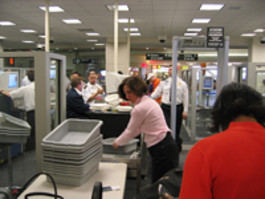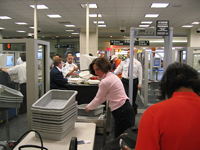 At what point does a thinking person become concerned with nuclear proliferation in the Middle East? This Tuesday both Israel and Syria announced their intentions to produce atomic power plants, ostensibly for peaceful energy-generating purposes in their nations. And of course the world has been warily keeping an eye on Iran as it proceeds with its own nuclear power program. And now word on the street is that Egypt, Jordan and United Arab Emirates are also eager to develop their own nuclear power. And who’s to blame any of them? After all, nuclear fission is environmentally cleaner than coal-burning, avoiding the belching of fossil fuels into our atmosphere, thus theoretically reducing global warming and its effects. The small matter of nuclear waste storage, of course, is a perplexing down-side to atomic power. But viva nuclear fission—and a brave new world precariously balanced on the edge between peaceful energy and nuclear weaponry.
At what point does a thinking person become concerned with nuclear proliferation in the Middle East? This Tuesday both Israel and Syria announced their intentions to produce atomic power plants, ostensibly for peaceful energy-generating purposes in their nations. And of course the world has been warily keeping an eye on Iran as it proceeds with its own nuclear power program. And now word on the street is that Egypt, Jordan and United Arab Emirates are also eager to develop their own nuclear power. And who’s to blame any of them? After all, nuclear fission is environmentally cleaner than coal-burning, avoiding the belching of fossil fuels into our atmosphere, thus theoretically reducing global warming and its effects. The small matter of nuclear waste storage, of course, is a perplexing down-side to atomic power. But viva nuclear fission—and a brave new world precariously balanced on the edge between peaceful energy and nuclear weaponry.
Will our civilization eventually destroy itself in a nuclear holocaust? I had a gentleman once explain to me that Jesus was hinting at nuclear destruction when he spoke the words of Luke 21:26—“‘Men will faint from terror, apprehensive of what is coming on the world, for the heavenly bodies will be shaken.’” Does Christ warn of apocalyptic nuclear proliferation? That isn’t how I read his somber words.
But while Holy Scripture is silent on the reality of nuclear fission, it is not a stranger to unbridled divine power. In fact the word it uses is the Greek dunamis, from whence comes our word “dynamite.” And it is not a coincidence that Paul seizes that word to describe the spiritual nuclear fission at Calvary: “For the message of the cross is foolishness to those who are perishing, but to us who are being saved it is the [explosive] power [dunamis--dynamite] of God” (I Corinthians 1:18). All the explosive spiritual-moral power of divinity was concentrated in the split-second fission at the cross—wherein the spotless and pure life of the incarnated God, Jesus Christ, became the moral receptacle for every sin every sinner like you and me has ever committed. “God made him who had no sin to be sin for us” (II Corinthians 5:21). Or as the ancient prophet described that explosive Calvary exchange: “And the Lord has laid on him the iniquity of us all” (Isaiah 53:6).
Truth is, there is no greater power in the universe than that unleashed by God for sinners at the foot of the cross, where the darkest guilt and the foulest sin are obliterated. “O let us contemplate the amazing sacrifice that has been made for us! Let us try to appreciate the labor and energy [nuclear fission] that Heaven is expending to reclaim the lost, and bring them back to the Father’s house. Motives stronger, and agencies more powerful, could never be brought into operation” (Steps to Christ 21—if you would like a free copy of this classic, see the offer at this website).
No wonder my friend Roger Morneau taught me to read the story of the cross (Matthew 27:24-54) every new morning. What better way to ensure spiritual nuclear proliferation? And who more powerful to enlist as your Savior, Protector and Friend than the Jesus of Calvary?


 In the space of one and a half months, our hemisphere has suffered two immense killer quakes—the 7.0 magnitude quake that leveled Port-au-Prince, Haiti, January 12, and left 230,000 dead and an entire country in economic ruin; and the magnitude 8.8 monster that ravaged Chile last Sabbath morning, unleashing destructive tsunamis in its wake (one eyewitness reported a wall of water “fifty feet” high). While the Chilean death toll was a small fraction of that in Haiti (because of enforced earthquake construction codes), the energy released by the Chilean quake was so immense scientists are now telling us it knocked our planet 3 inches off its axis, thus shortening our day by 1.26 microseconds. Our hearts and our prayers (and our financial gifts—go to
In the space of one and a half months, our hemisphere has suffered two immense killer quakes—the 7.0 magnitude quake that leveled Port-au-Prince, Haiti, January 12, and left 230,000 dead and an entire country in economic ruin; and the magnitude 8.8 monster that ravaged Chile last Sabbath morning, unleashing destructive tsunamis in its wake (one eyewitness reported a wall of water “fifty feet” high). While the Chilean death toll was a small fraction of that in Haiti (because of enforced earthquake construction codes), the energy released by the Chilean quake was so immense scientists are now telling us it knocked our planet 3 inches off its axis, thus shortening our day by 1.26 microseconds. Our hearts and our prayers (and our financial gifts—go to 
 Why are the “talking heads” so glum? Thomas Friedman, in his Sunday column in the New York Times, reported that because of the economic downturn the residents of Tracy, California, are now going to be charged to use their emergency 911 service. You can pay $48 a year to cover unlimited 911 calling, or you can wait and be billed $300 for every time you have an emergency. “Welcome to the lean years,” Friedman opined. For the past seventy years Americans have lived off the fat of the land. Our parents may have been the Greatest Generation, but we have become the Grasshopper Generation, Friedman observed, “eating through the prosperity that was bequeathed us like hungry locusts.” But after the feast comes the famine. “Let’s just hope our lean years will only number seven,” referring to the Genesis story of the crippling Egyptian famine.
Why are the “talking heads” so glum? Thomas Friedman, in his Sunday column in the New York Times, reported that because of the economic downturn the residents of Tracy, California, are now going to be charged to use their emergency 911 service. You can pay $48 a year to cover unlimited 911 calling, or you can wait and be billed $300 for every time you have an emergency. “Welcome to the lean years,” Friedman opined. For the past seventy years Americans have lived off the fat of the land. Our parents may have been the Greatest Generation, but we have become the Grasshopper Generation, Friedman observed, “eating through the prosperity that was bequeathed us like hungry locusts.” But after the feast comes the famine. “Let’s just hope our lean years will only number seven,” referring to the Genesis story of the crippling Egyptian famine. 
 “An estimated 1 million kids orphaned by quake.” That stunning headline is enough to break your heart, isn’t it? Barely two weeks into the Haitian catastrophe, and the unfolding saga keeps peeling back layer after layer of the immense heartache and suffering that our Caribbean neighbors are enduring.
“An estimated 1 million kids orphaned by quake.” That stunning headline is enough to break your heart, isn’t it? Barely two weeks into the Haitian catastrophe, and the unfolding saga keeps peeling back layer after layer of the immense heartache and suffering that our Caribbean neighbors are enduring.
 Haiti’s devastating earthquake on Tuesday afternoon is our crisis, too. As I sit here and write the next morning, initial reports from Port-au-Prince indicate that much of the capital city of nearly 1.5 million residents lies buried beneath collapsed rubble, as the result of the 7.0 magnitude record-breaking temblor. The Parliament building, the presidential palace, the United Nations mission headquarters, hospitals, schools, churches and untold numbers of apartments, houses and tenement buildings have been flattened. How many lives have been lost in this epic disaster no one, of course, yet knows. Some already fear untold thousands of casualties.
Haiti’s devastating earthquake on Tuesday afternoon is our crisis, too. As I sit here and write the next morning, initial reports from Port-au-Prince indicate that much of the capital city of nearly 1.5 million residents lies buried beneath collapsed rubble, as the result of the 7.0 magnitude record-breaking temblor. The Parliament building, the presidential palace, the United Nations mission headquarters, hospitals, schools, churches and untold numbers of apartments, houses and tenement buildings have been flattened. How many lives have been lost in this epic disaster no one, of course, yet knows. Some already fear untold thousands of casualties.
 Do you really think new “pat down” measures at the airport will make air travel more secure? I read a piece by syndicated British columnist Gwynne Dyer, and I’m afraid he’s right. In response to the Christmas Day attempt to bring down that Detroit-bound airliner through concealed explosives on one of the passengers, government officials have had to devise some sort of official “upgrade” to our present travel security to assure the traveling public that the skies once again are “friendly.” Dyer comments, “It is the duty of all public officials to ‘do something’ whenever a new threat appears, even if there is nothing sensible to be done.” The truth is that profiling international travelers by nationality or country of birth or origin (as the new security regulations do) not only lumps vast numbers of innocent people into the category of “suspicious” (or, guilty until proven innocent), it assumes that terror and terrorists are limited to these watch-listed nations (which is hardly true). And as for hand searches, most agree that the only effective method of full-body screening would need to include “body cavity searches.” And the public will not stand for that, will we?
Do you really think new “pat down” measures at the airport will make air travel more secure? I read a piece by syndicated British columnist Gwynne Dyer, and I’m afraid he’s right. In response to the Christmas Day attempt to bring down that Detroit-bound airliner through concealed explosives on one of the passengers, government officials have had to devise some sort of official “upgrade” to our present travel security to assure the traveling public that the skies once again are “friendly.” Dyer comments, “It is the duty of all public officials to ‘do something’ whenever a new threat appears, even if there is nothing sensible to be done.” The truth is that profiling international travelers by nationality or country of birth or origin (as the new security regulations do) not only lumps vast numbers of innocent people into the category of “suspicious” (or, guilty until proven innocent), it assumes that terror and terrorists are limited to these watch-listed nations (which is hardly true). And as for hand searches, most agree that the only effective method of full-body screening would need to include “body cavity searches.” And the public will not stand for that, will we?
 Poor Jesse Sheidlower, editor at large of the Oxford English Dictionary—he can’t even show up at a holiday party without being cornered by another distraught denizen of the English-speaking world with the query, “What are we supposed to call the decade that’s now ended?” Pretend you’re the editor of the dictionary—how would you answer all those emails? After all, we call the 80’s the 80’s and the 90’s the 90’s. But what shall we call the 00’s? The Zeroes? Hardly. How about the Aughts (English for the number 0)? Or the Ohs? Or the Oh-Ohs (I like that one!)?
Poor Jesse Sheidlower, editor at large of the Oxford English Dictionary—he can’t even show up at a holiday party without being cornered by another distraught denizen of the English-speaking world with the query, “What are we supposed to call the decade that’s now ended?” Pretend you’re the editor of the dictionary—how would you answer all those emails? After all, we call the 80’s the 80’s and the 90’s the 90’s. But what shall we call the 00’s? The Zeroes? Hardly. How about the Aughts (English for the number 0)? Or the Ohs? Or the Oh-Ohs (I like that one!)?